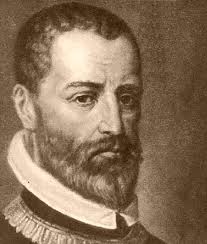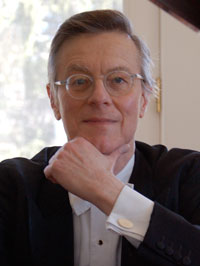This Week in Classical Music: February 3, 2020.Palestrina, Peter Serkin.Giovanni Pierluigi da Palestrina might have been born on this day in 1525, although it could be any day between February 3rd of 1525 and February 2nd of 1526: he died on February 2nd of 1594 and the eulogist mentioned that he was 68, and according to other sources, he died one day short of his 69th birthday. One of the greatest composers of the late Renaissance, he was recognized as such during his lifetime: in 1575, the agent of the Duke of Ferrara, who, we can assume, was very knowledgeable in these things as the Duke’s court was Italy’s musical center, had written of Palestrina that he was “now considered the very first musician in the world.”Palestrina’s output was enormous: 104 masses are extant, about 300 motets and many other pieces of music.In addition to the church music, he wrote 140 madrigals, some set to pieces of secular poetry.Here’s an example, a madrigal Chiare fresche e dolci acque (Clear, sweet fresh water/where she, the only one who seemed/woman to me, rested her beautiful limbs – a sonnet by Petrarch).Pro Musica Antiqua, Milan, is directed by Giovanni Vianini.
While we’re not sure about Palestrina’s exact birthdate, we can be fairly certain that Felix Mendelssohn was born on this day in 1809.It took almost three centuries for music to evolve from the polyphony of Palestrina to the romanticism of Mendelssohn, but just three quarters of a century to propel it to the twelve-tone technique of Alban Berg.Berg was born in Vienna on February 9th of 1885.Also on February 9th, in 1937, a wonderful German soprano was born, Hildegard Behrens.She was great in the Wagnerian repertoire.Here’s the last aria of Wagner’s Tristan und Isolde, Mild und leise wie er lächelt (Mildly and gently, how he smiles).In this 1986 recording Hildegard Behrens sings Isolde; the Munich Radio Orchestra is conducted by Peter Schneider.
Some sad news: Peter Serkin died on February 1st from pancreatic cancer at the age of 72.Peter was born on July 24th, 1947 in New York, his father was the renowned pianist Rudolf Serkin, his grandfather – the violinist Adolf Busch.Despite, or maybe because of this, Peter was never comfortable with the classical music establishment.He started performing in public at the age of 12.In 1965, at age 18, he recorded Bach’s Goldberg Variations, which were very well received (he made three other recordings of the Variations, the last one in 1994).Then, at the age of 21, he stopped playing music altogether and didn’t touch the piano for the next three years.He said that he decided to resume playing after listening to a radio broadcast of Bach’s music.Peter Serkin was exceptionally good in the modern repertoire.He played Olivier MessiaenVingt Regards sur L'Enfant Jesus, an extremely complex 20-part suite lasting about two and a half hours, from memory.His recording of this piece is considered one of the very best.Peter was still playing concerts in 2019.His death is a great loss.
Palestrina, Peter Serkin 2020
This Week in Classical Music: February 3, 2020. Palestrina, Peter Serkin. Giovanni Pierluigi da Palestrina might have been born on this day in 1525, although it could be any day between February 3rd of 1525 and February 2nd of 1526: he died on February 2nd of 1594 and the eulogist mentioned that he was 68, and according to other sources, he died one day short of his 69th birthday. One of the greatest composers of the late Renaissance, he was recognized as such during his lifetime: in 1575, the agent of the Duke of Ferrara, who, we can assume, was very knowledgeable in these things as the Duke’s court was Italy’s musical center, had written of Palestrina that he was “now considered the very first musician in the world.” Palestrina’s output was enormous: 104 masses are extant, about 300 motets and many other pieces of music. In addition to the church music, he wrote 140 madrigals, some set to pieces of secular poetry. Here’s an example, a madrigal Chiare fresche e dolci acque (Clear, sweet fresh water/where she, the only one who seemed/woman to me, rested her beautiful limbs – a sonnet by Petrarch). Pro Musica Antiqua, Milan, is directed by Giovanni Vianini.
between February 3rd of 1525 and February 2nd of 1526: he died on February 2nd of 1594 and the eulogist mentioned that he was 68, and according to other sources, he died one day short of his 69th birthday. One of the greatest composers of the late Renaissance, he was recognized as such during his lifetime: in 1575, the agent of the Duke of Ferrara, who, we can assume, was very knowledgeable in these things as the Duke’s court was Italy’s musical center, had written of Palestrina that he was “now considered the very first musician in the world.” Palestrina’s output was enormous: 104 masses are extant, about 300 motets and many other pieces of music. In addition to the church music, he wrote 140 madrigals, some set to pieces of secular poetry. Here’s an example, a madrigal Chiare fresche e dolci acque (Clear, sweet fresh water/where she, the only one who seemed/woman to me, rested her beautiful limbs – a sonnet by Petrarch). Pro Musica Antiqua, Milan, is directed by Giovanni Vianini.
While we’re not sure about Palestrina’s exact birthdate, we can be fairly certain that Felix Mendelssohn was born on this day in 1809. It took almost three centuries for music to evolve from the polyphony of Palestrina to the romanticism of Mendelssohn, but just three quarters of a century to propel it to the twelve-tone technique of Alban Berg. Berg was born in Vienna on February 9th of 1885. Also on February 9th, in 1937, a wonderful German soprano was born, Hildegard Behrens. She was great in the Wagnerian repertoire. Here’s the last aria of Wagner’s Tristan und Isolde, Mild und leise wie er lächelt (Mildly and gently, how he smiles). In this 1986 recording Hildegard Behrens sings Isolde; the Munich Radio Orchestra is conducted by Peter Schneider.
Some sad news: Peter Serkin died on February 1st from pancreatic cancer at the age of 72. Peter was born on July 24th, 1947 in New York, his father was the renowned pianist Rudolf Serkin, his grandfather – the violinist Adolf Busch. Despite, or maybe because of this, Peter was never comfortable with the classical music establishment. He started performing in public at the age of 12. In 1965, at age 18, he recorded Bach’s Goldberg Variations, which were very well received (he made three other recordings of the Variations, the last one in 1994). Then, at the age of 21, he stopped playing music altogether and didn’t touch the piano for the next three years. He said that he decided to resume playing after listening to a radio broadcast of Bach’s music. Peter Serkin was exceptionally good in the modern repertoire. He played Olivier Messiaen Vingt Regards sur L'Enfant Jesus, an extremely complex 20-part suite lasting about two and a half hours, from memory. His recording of this piece is considered one of the very best. Peter was still playing concerts in 2019. His death is a great loss.
Peter was born on July 24th, 1947 in New York, his father was the renowned pianist Rudolf Serkin, his grandfather – the violinist Adolf Busch. Despite, or maybe because of this, Peter was never comfortable with the classical music establishment. He started performing in public at the age of 12. In 1965, at age 18, he recorded Bach’s Goldberg Variations, which were very well received (he made three other recordings of the Variations, the last one in 1994). Then, at the age of 21, he stopped playing music altogether and didn’t touch the piano for the next three years. He said that he decided to resume playing after listening to a radio broadcast of Bach’s music. Peter Serkin was exceptionally good in the modern repertoire. He played Olivier Messiaen Vingt Regards sur L'Enfant Jesus, an extremely complex 20-part suite lasting about two and a half hours, from memory. His recording of this piece is considered one of the very best. Peter was still playing concerts in 2019. His death is a great loss.